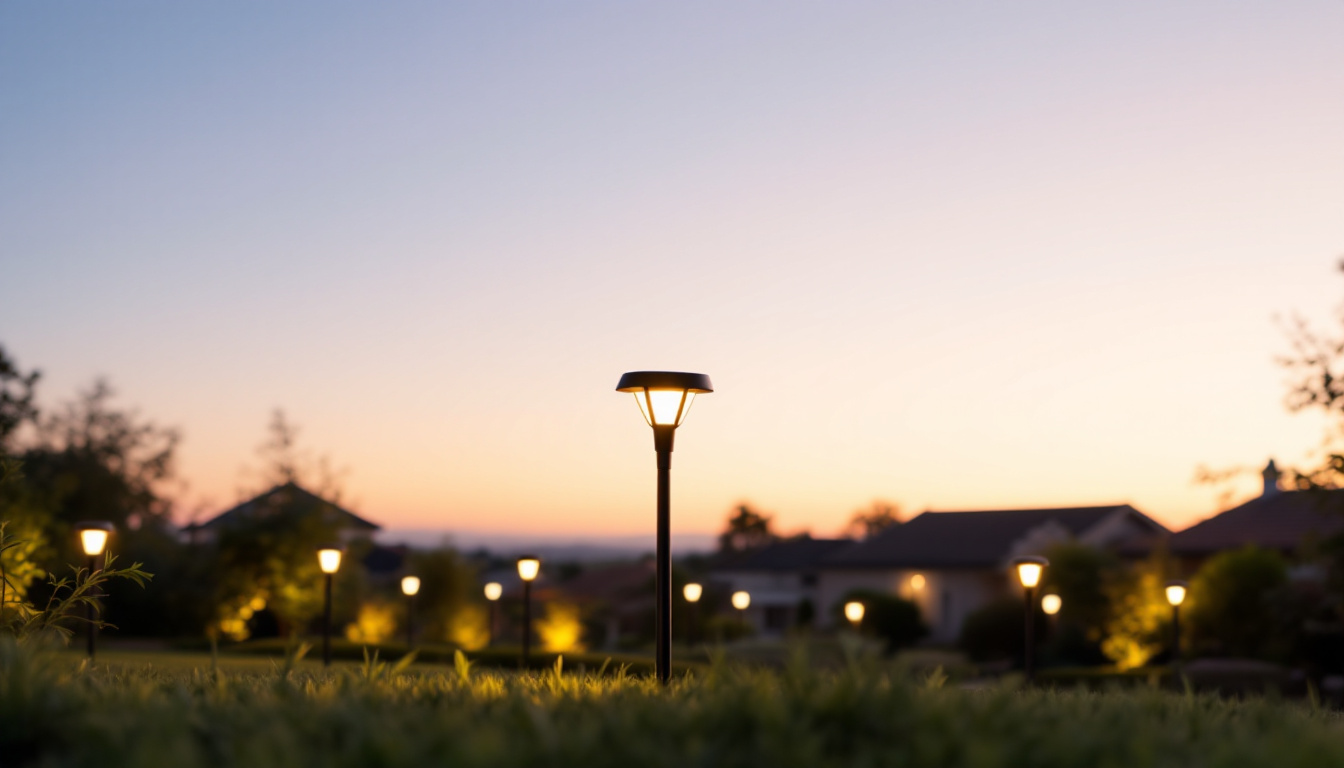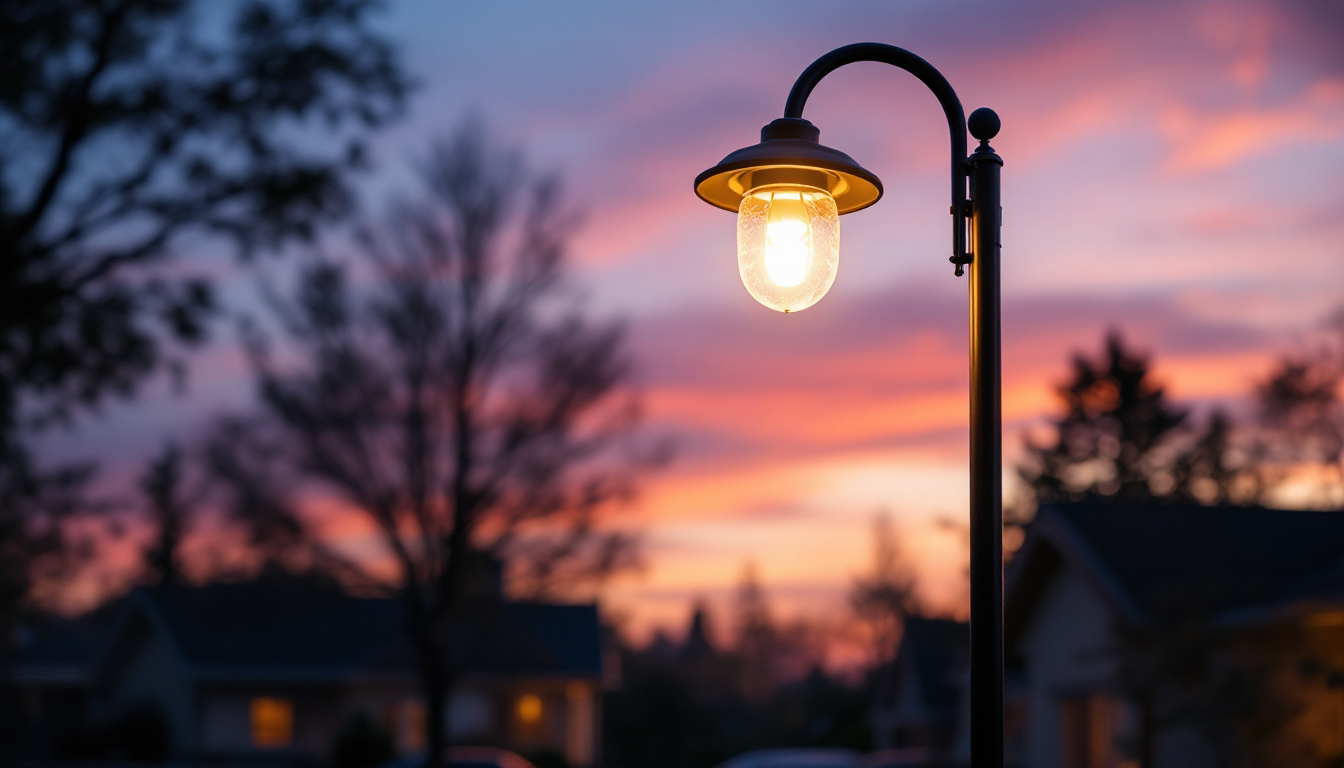
As the demand for sustainable energy solutions continues to rise, solar lights have emerged as a popular choice for outdoor illumination. For lighting contractors, understanding the intricacies of solar lighting systems is essential to meet client expectations and enhance project offerings. This comprehensive guide explores the various aspects of solar lights for yards, providing valuable insights for contractors looking to expand their expertise in this field.
Solar lights operate by harnessing the sun’s energy, converting it into electricity, and using it to power LED bulbs. This technology is not only eco-friendly but also cost-effective in the long run. For lighting contractors, grasping the fundamentals of solar lighting technology is crucial for effective installation and maintenance.
A typical solar lighting system consists of several key components, including solar panels, batteries, LED lights, and control systems. Each component plays a vital role in ensuring the efficiency and longevity of the lighting solution.
Solar panels capture sunlight and convert it into electrical energy. The batteries store this energy for use during nighttime or cloudy days. LED lights are favored for their energy efficiency and long lifespan, while control systems manage the operation of the lights, such as turning them on or off based on ambient light levels.
There are various types of solar lights available in the market, each designed for specific applications. Pathway lights, flood lights, spotlights, and decorative lights are some common options. Understanding the differences and applications of these types will help contractors recommend the best solutions to their clients.
Pathway lights are ideal for illuminating walkways and driveways, enhancing safety while adding aesthetic appeal. Flood lights provide broader illumination for larger areas, making them suitable for security purposes. Spotlights can highlight specific features in a yard, such as trees or sculptures, while decorative lights add a touch of charm and ambiance.
Solar lighting systems offer numerous advantages that make them an attractive option for both contractors and clients. Firstly, they are environmentally friendly, reducing reliance on fossil fuels. Secondly, they can significantly lower energy costs, as they do not require electricity from the grid.
Moreover, solar lights are easy to install, requiring minimal infrastructure. This can lead to reduced labor costs and quicker project completion times. Additionally, advancements in solar technology have improved the performance and reliability of these systems, making them a viable choice for various outdoor lighting needs.
Installing solar lights requires careful planning and consideration to ensure optimal performance. Lighting contractors should be aware of several factors that can impact the effectiveness of solar lighting systems.
A thorough site assessment is the first step in any solar lighting installation project. Contractors should evaluate the amount of sunlight the area receives throughout the day, as this will directly influence the performance of the solar panels. Areas with significant shade from trees or buildings may require additional planning or alternative solutions.
Additionally, understanding the layout of the yard, including pathways, gardens, and other features, will help in determining the best placement for the solar lights. This assessment will also aid in calculating the number of lights needed to achieve the desired illumination levels.
With a variety of solar lights available, selecting the right products for a specific project is crucial. Contractors should consider factors such as brightness, battery capacity, and design aesthetics when making their choices.
Brightness is typically measured in lumens, and selecting lights with the appropriate lumen output for the intended application is essential. For example, pathway lights may require lower lumens than flood lights. Battery capacity is also important, as it determines how long the lights will operate during the night.
Proper installation techniques are vital to ensure the longevity and effectiveness of solar lights. Contractors should follow manufacturer guidelines closely, as different products may have specific requirements.
Generally, solar lights should be installed in locations that receive direct sunlight for most of the day. The solar panels should be positioned to maximize sun exposure, while the lights themselves should be placed at appropriate heights to provide adequate illumination without causing glare.
While solar lights are generally low-maintenance, periodic checks and maintenance are necessary to ensure optimal performance. Lighting contractors should educate clients on the importance of maintaining their solar lighting systems.
Dust, dirt, and debris can accumulate on solar panels, reducing their efficiency. Regular cleaning of the panels is essential to maintain their ability to capture sunlight effectively. A simple wipe with a damp cloth can often do the trick, ensuring that the panels remain clear and functional.
Additionally, checking for any obstructions, such as overhanging branches, can help maintain optimal sunlight exposure. Contractors should advise clients to trim back any foliage that may block sunlight from reaching the solar panels.
The batteries in solar lighting systems typically have a lifespan of several years, but their performance can degrade over time. Contractors should recommend that clients monitor the brightness of the lights and replace the batteries as needed.
It is also important to educate clients on the signs of battery failure, such as dimming lights or lights that do not turn on at all. Promptly addressing these issues can prevent further complications and ensure the continued effectiveness of the solar lighting system.
Contractors should be prepared to troubleshoot common issues that may arise with solar lights. If lights are not functioning as expected, the first step is to check the solar panels for dirt or obstructions. If the panels are clean and unobstructed, the next step is to inspect the batteries for signs of wear or failure.
In some cases, the issue may be related to the control system. Ensuring that the lights are set to the appropriate mode and that any timers or sensors are functioning correctly can resolve many operational problems.
Creating an effective lighting layout is essential for maximizing the benefits of solar lights in a yard. Lighting contractors should consider both functionality and aesthetics when designing lighting layouts.
Functional lighting is designed to enhance safety and visibility in outdoor spaces. Pathway lighting should be placed at regular intervals to ensure that walkways are well-illuminated, preventing accidents and guiding visitors safely through the yard.
In addition to pathway lights, flood lights can be strategically positioned to illuminate larger areas, such as driveways or patios. These lights can also serve a security purpose, deterring potential intruders by providing bright illumination in vulnerable spots.
Aesthetic lighting focuses on enhancing the visual appeal of a yard. This can include spotlighting trees, gardens, or architectural features to create a beautiful ambiance during the evening hours. Contractors should work with clients to identify key features they wish to highlight and design a layout that complements the overall landscape.
Incorporating decorative solar lights can further enhance the aesthetic appeal, adding charm and character to outdoor spaces. String lights, lanterns, and decorative post lights can create a warm and inviting atmosphere, making outdoor areas more enjoyable for gatherings and relaxation.
The solar lighting industry is continuously evolving, with new trends and innovations emerging regularly. Staying informed about these developments can help lighting contractors offer cutting-edge solutions to their clients.
Smart solar lighting systems are gaining popularity, allowing for enhanced control and customization. These systems can be integrated with smart home technology, enabling users to control their lights remotely via smartphones or voice-activated devices.
Features such as motion sensors, dimming capabilities, and programmable schedules can enhance the functionality of solar lights, making them more efficient and user-friendly. Contractors should consider recommending smart solar lighting options to clients looking for modern, tech-savvy solutions.
Innovations in design are also shaping the solar lighting landscape. Sleek, modern designs are becoming more prevalent, appealing to clients who prioritize aesthetics in their outdoor spaces. Additionally, solar lights are now available in a wider range of styles and colors, allowing contractors to cater to diverse client preferences.
Furthermore, advancements in solar panel technology have led to more compact and efficient designs, enabling the integration of solar lights into various architectural styles without compromising on performance.
Ongoing research and development in solar technology are resulting in more efficient solar panels and batteries. These advancements mean that solar lights can operate for longer periods and provide brighter illumination, making them an even more attractive option for outdoor lighting.
Contractors should stay abreast of these advancements to ensure they are offering the most efficient and reliable products to their clients. This knowledge can also help in addressing any concerns clients may have regarding the performance of solar lighting systems.
Solar lights present a unique opportunity for lighting contractors to expand their service offerings while contributing to a more sustainable future. By understanding the technology, installation considerations, maintenance requirements, and design possibilities, contractors can effectively meet the needs of their clients.
As the market for solar lighting continues to grow, staying informed about trends and innovations will be essential for contractors looking to remain competitive. Embracing solar lighting solutions not only enhances project portfolios but also aligns with the increasing demand for environmentally friendly practices in the lighting industry.
Incorporating solar lights into yard designs can transform outdoor spaces, providing both functionality and beauty. For lighting contractors, mastering the art of solar lighting is not just a business opportunity; it is a step towards a brighter, greener future.
Ready to elevate your lighting projects with the most efficient and sustainable solar solutions? At LumenWholesale, we provide lighting contractors like you with the highest quality, spec-grade solar lights at unbeatable wholesale prices. Say goodbye to local distributor markups and hello to our extensive selection that meets rigorous industry standards. With free shipping on bulk orders, you can trust that you’re getting premium lighting at the best value — all without hidden fees or compromises. Transform your outdoor spaces with the perfect blend of quality, affordability, and convenience. Explore our wholesale lighting options and take the first step towards a brighter, greener future with LumenWholesale.

Discover how motion light switches can revolutionize the way lighting contractors manage projects, offering significant cost savings and efficiency.

Discover how understanding ceiling light components can enhance your business profitability.

Discover the essentials of outside light poles from a lighting contractor’s perspective.

Discover practical solutions for lighting contractors facing challenges with washer dryer outlet adapters.